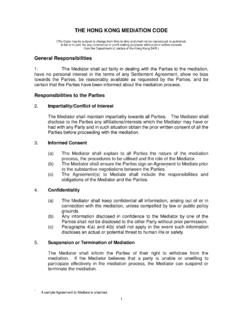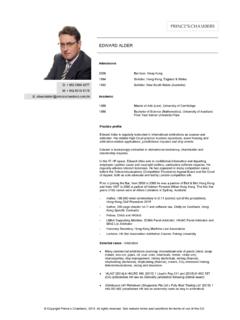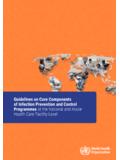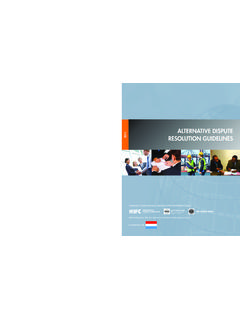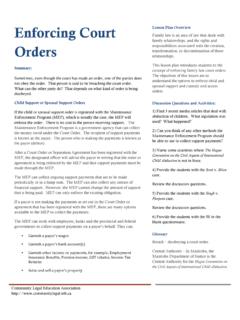Transcription of Third Party Funding in International Arbitration -the ...
1 March 2018 Number 39. Third Party Funding in International Arbitration -the perspective from Japanese law- Aoi Inoue*. 1. Introduction by changes in the law in certain countries. On 10. In recent years, Third Party Funding in International January 2017, the Singapore Parliament passed the Arbitration has increased significantly. While there Civil Law (Amendment) Act (Bill No. 38/2016), which are various definitions of the term Third Party fund- has since entered into force in March 2017. The ing , the notable arbitrator Mr. Yves Derains once amended Civil Law Act now permits Third Party fund- defined Third - Party Funding as a scheme where a ing for International Arbitration and related court pro- Party unconnected to a claim finances all or part of ceedings, subject to certain conditions. In the same one of the parties' Arbitration costs, in most cases the vein, Hong Kong has also adopted the Arbitration and claimant. The funder is then remunerated by an Mediation Legislation ( Third Party Funding ) (Amend- agreed percentage of the proceeds of the award, a ment) Bill 2016 on 14 June 2017, allowing for Third - success fee, or a combination of the two or through Party Funding of arbitrations which are seated in more sophisticated devices.
2 In the case of an unfa- Hong Kong. vourable award, the funder's investment is lost. 1. The main reason for TPF's rising popularity is self-evi- The wider topic of Third Party Funding encompasses dent. International Arbitration is becoming increas- numerous issues such as disclosure; conflicts of inter- ingly expensive. In the 2015 Queen Mary Interna- est; privilege; and security for costs, all of which are tional Arbitration Survey, 90% of the respondents ripe for discussion. That being said, for the purposes answered that International Arbitration is their pre- of this newsletter, I would like to first set out some of ferred dispute resolution method, but 68% of the the basic features of Third Party Funding , before con- respondents indicated high costs as the worst charac- centrating on Third Party Funding ( TPF ) from the teristics of International perspective of Japanese law, and the possibility of such a system operating in Japan. While the cost of a specific Arbitration will of course depend on the facts and complexity of that case, it is 2.
3 Third Party Funding in International Arbitration difficult to ignore that the costs are generally high. In There is already considerable use of TPF arrange- 2011 CIArb conducted a survey of 254 International ments in International Arbitration today. The 2015 commercial arbitrations conducted between 1991. Queen Mary International Arbitration Survey2 indi- and 2010. According to that survey, claimants on cates that 39% of the respondents have already average spend GBP 1,580,000 (approximately 232. encountered Third Party Funding in practice: 12% m i l l i o n ye n ) , wh i l e r e s p o n d e n t s s p e n d G B P. have used it themselves and 27% have seen it being 1,413,000 (approximately 208 million yen).5. The use of TPF has also further been facilitated * Partner, Anderson Mori & Tomotsune. The views expressed in this article are solely those of the author, and do not represent those views of the organization to which the author belongs.
4 1 Yves DERAINS, Foreword to Third - Party in International Arbitration , in Bernardo M. CREMADES and Antonias DIMOLITSA (eds), Third - Party Funding in International Arbitration , (ICC Dossier 2013), at p. 5. 2 Queen Mary University of London and While & Case, 2015 International Arbitration Survey: Improvements and Innovations in International Arbitration . (2015) available at (last accessed 12 February 2018). 3 2015 International Arbitration Survey: Improvements and Innovations in International Arbitration , at 4 2015 International Arbitration Survey: Improvements and Innovations in International Arbitration , at p. 5 and p. 7. 5 CIArb, CIArb Costs of International Arbitration Survey 2011, at 1. 21903636_JCAA 1 18/03/13 16:38. Under such circumstances, a reason often raised in to other funders for a specified time. support of TPF is that it promotes access to justice . and levels the playing field. 6 In other words, TPF (4) Funder's Detailed Due Diligence.
5 Allows victims of obvious wrongdoings to bring their Funders will then carry out detailed due diligence cases to justice notwithstanding the cost. to assess the case and reach a decision on whether funds should be given. Many funders adopt a On the other hand, an objection raised against TPF is multi-step process, and may have a preliminary that it may contribute to an increase in the total num- screening process followed by substantive due dili- ber of legal disputes, as well as an increase in the gence. number of frivolous or unmeritorious claims. How- ever, it has been often said that such an objection (5) Execution of an Investment Agreement;. does not take into account the rigorous case assess- If the funder is satisfied that funds should be dis- ment processes of Third Party funders. In fact, most bursed, then the funder and the funded Party will Third Party funders have been noted as requiring a enter into an investment agreement (the IA ).
6 High probability of success before Funding the Broadly speaking, under the investment agreement, the funder will agree to pay for all, or a specified 3. Process of Third Party Funding portion of, the funded Party 's costs arising from the Each funder will employ its own knowhow for the claim, in exchange for a share of any recovery fol- case assessment process, and hence the exact process lowing the settlement of the claim, or the issuance may differ significantly between funders. For the pur- of a final award. poses of this article, I would like to briefly go over a relatively straight forward example of the Funding (6) Case Monitoring;. The IA typically entitles the funder to be informed of all relevant developments in the case, and to (1) Funder's Initial Case Assessment; receive the corresponding documents. The funder The funder will check whether the case meets the may also be entitled to regular contact with the funder's investment criteria through its own initial funded Party 's counsel, depending on the stage of case assessment.
7 For instance, the quantum of the the proceedings. claim, investments costs and time until expected recovery, merits of the claim, respondent's solven- (7) Case Conclusion cy, enforceability of the award, and legal team If the funded Party succeeds in its claim, or the expertise are some of the factors that will be con- claim is settled, the funder is entitled to a portion sidered. of the recovered amount as agreed under the IA. ( , 30% of the total recovered amount). If the (2) Execution of Confidentiality Agreement(s); case is unsuccessful, the funder will bear all agreed Also, funders will typically enter into confidentiali- costs up to the date when the case is lost or discon- ty agreements with parties who are applying for tinued. funds, prior to materials being shared for the case assessment process. The purpose of such agree- 4. Japan - Potential Market for Third Party Funding ? ments is to allow both parties to indicate their While TPF is hotly debated among Arbitration practi- expectation that the documents shared during the tioners, it would be fair to say TPF is not yet common case assessment are in Japan.
8 In Japan, professional funders are not active in the market for International Arbitration . It is (3) Setting Period of Exclusivity to Conclude Invest- my understanding that currently there are no local ment Agreement; funders in Japan. Therefore, even if there is a TPF. Some funders may require parties seeking Funding market in Japan, so far the only participation has to sign an exclusivity agreement at the beginning of been from International funders. case assessment, which in gist require that the Party seeking Funding cannot present the same case Nevertheless, I believe that Japanese parties could be 6 Jonas von Goeler, Third - Party Funding in International Arbitration and its Impact on Procedure, at p. 82-88, Christopher P. Bogart, Overview of Arbitration finance , in Bernardo M. CREMADES and Antonias DIMOLITSA (eds), Third - Party Funding in International Arbitration , (ICC Dossier 2013), at p. 51. 7 Jonas von Goeler, Third - Party Funding in International Arbitration and its Impact on Procedure, at p.
9 91-95. 8 Jonas von Goeler, Third - Party Funding in International Arbitration and its Impact on Procedure, at p. 13-23. 9 Jonas von Goeler, Third - Party Funding in International Arbitration and its Impact on Procedure, at p. 17. 2. 21903636_JCAA 2 18/03/13 16:38. potential users of TPF, for the following reasons. proceeds) and barratry (continuing maintenance or champerty) are generally not applicable in Japan. First, as litigation in Japan does not require the exten- sive document production process sometimes seen in Furthermore, while pure contingency fee arrange- common law jurisdictions, it can be said that litiga- ments were previously regarded as inappropriate in tion costs are relatively cheaper in Japan compared to Japan, the same arrangements are currently not con- common law jurisdictions. However, when Japanese sidered to be specifically parties participate in International Arbitration pro- ceedings, document production is usually required While there is no direct prohibition, there are some (however the scope of production will of course vary laws which may indirectly affect TPF arrangements.
10 From case to case) and this will drive up cost. Fur- In the remainder of this article, I shall discuss two thermore, International Arbitration will also typically such potential impediments to TPF arrangements in be conducted in English, and Japanese parties will Japan, namely Article 10 of Trust Act of Japan (Act incur considerable translation fees. All these factors No. 108 of 2006) (Prohibition on Trusts for Suits) and result in Arbitration costs being quite expensive from the Japanese Attorney Act (Act No. 205 of 1949). the perspective of Japanese parties, and correspond- ingly give rise to a possible demand for TPF arrange- 6. Legal Impediments? - Trust Act of Japan ments. The Trust Act at Article 10 (Prohibition on Trusts for Suits) stipulates that No trust may be created for the Second, in Japanese litigation the winning Party can primary purpose of having another person conduct in principle only recover court fees from the losing any procedural act.


